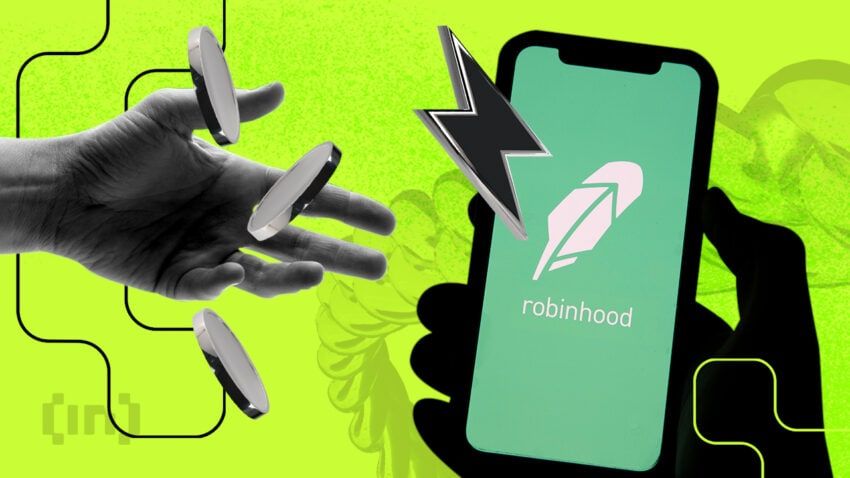Coinbase and Robinhood are among the world’s most popular crypto trading platforms. Both offer distinct advantages depending on your trading preferences. This article compares both platforms, focusing on fees, features, user experience, and other key elements to help you decide which better meets your trading needs.
KEY TAKEAWAYS
➤ Coinbase is a cryptocurrency exchange offering over 100 tradable assets.
➤ Robinhood provides commission-free trading for cryptocurrencies, stocks, and ETFs, aimed at beginner investors.
➤ Coinbase is better for users seeking a wide range of cryptocurrencies and advanced trading features like staking.
➤ Robinhood is ideal for beginners looking for easy stock and cryptocurrency trades with no commission fees.
Coinbase vs. Robinhood in a nutshell
If you are pressed for time and quickly want to learn the differences between Coinbase and Robinhood, here is a quick overview for your reference:
| Features | Coinbase | Robinhood |
| Fee structure | Variable fees based on transaction type | Commission-free trades for most assets |
| Trading platform | Advanced with numerous features | Simplified and user-friendly |
| Crypto exchange | Yes | No |
| User-friendliness | Moderate | High |
| Payment methods | Bank transfers, debit and credit cards | Bank transfers, debit cards |
| Commission-free trades | No | Yes |
| Cryptocurrency trading | Extensive list of coins | Limited selection |
What is Coinbase?
Coinbase is a cryptocurrency exchange that simplifies buying and selling crypto. The platform allows users to buy, sell, and exchange over 100 cryptocurrencies.
➤ Coinbase is ideal for beginners making buy and sell orders, while advanced users can access additional features through Coinbase Pro.
As of Sept. 10, 2024, Coinbase has a market cap of nearly $39 billion. It serves over 98 million users and holds $269 billion in assets.
The company was founded in 2012 by Brian Armstrong and Fred Ehrsam. It started as a way for people to send and receive Bitcoin without having to exchange coins for fiat currencies. The platform has since grown at a clip. As of September 2024, it has over 3,400 employees working in more than 100 countries worldwide.
➤ Coinbase is the first publically traded cryptocurrency exchange in the US.
However, the company has faced compliance issues in the country. For instance, it reached a $100 million settlement with the New York Department of Financial Services in January 2023 over past AML and KYC shortcomings.
Coinbase pros and cons
Pros |
Cons |
Unique selection of cryptocurrencies |
High trading fees |
24/7 customer support |
Recent security breach |
Quality educational materials |
Complex fee structure |
What is Robinhood?

Launched in 2013, Robinhood is known for its commission-free trading of stocks, ETFs, options, and cryptocurrencies. By the end of August 2024, the platform was serving 24.3 million funded customers and $143.6 billion in assets under customer (AUC), Robinhood announced in a press release.
➤ The company stands out as an alternative to high-fee brokerages, offering tools to help users make smarter investments while saving on fees. It also provides third-party research reports to assist investors in making informed decisions.
Users can invest in cryptocurrencies using Robinhood Crypto and precious metals like gold or platinum through the Gold Buying & Selling feature.The platform also offers its debit card, Robinhood Gold, which allows customers to make purchases using their digital assets without paying fees or interest.
➤ However, like Coinbase, Robinhood has also been no stranger to controversy. The platform was accused of market manipulation after freezing customer withdrawals during the GameStop debacle.
In 2021, Robinhood was ordered by FINRA — the financial industry regulatory authority — to pay nearly $70 million in fines. Robinhood was found to have caused “widespread and significant” harm on multiple fronts; this included misleading customers about the money in their accounts.
Then, in August 2022, Robinhood was fined another $30 million by the DFS for violations of AML and cybersecurity regulations.
Robinhood pros and cons
Pros |
Cons |
Easy to use design |
Can’t withdraw crypto funds |
Allows cryptocurrency and fractional share trading |
Limited cryptocurrencies available |
Instance access to funds |
Available to US players only |
No commission fees |
A reputation of misleading customers |
At a glance: Robinhood vs. Coinbase
Information |
Coinbase | Sign up |
Robinhood | Sign up |
|---|---|---|
Headquarters |
San Francisco, USA |
Menlo Park, USA |
Company Type |
Broker exchange, buy, and sell options |
Broker exchange plus traditional stocks |
Security |
High |
Medium |
Fees |
Medium-Low |
Low |
User friendly |
Yes |
Yes |
Year established |
2012 |
2013 |
Flat trading |
Yes |
Yes |
Coinbase vs Robinhood: Major differences compared

Here are the major differences you need to know:
Coinbase vs Robinhood: Trading fees
Coinbase and Robinhood take different approaches to trading fees. Robinhood charges no commissions for cryptocurrency transactions. However, “commission-free” trades aren’t necessarily cost-free.
Robinhood earns money from the payment for order flow, a practice where the platform sends orders to market makers who pay Robinhood for this order flow. While this is banned in the UK and Canada, it remains a common practice in the U.S.
In contrast, Coinbase charges fees, ranging from 0.05% to 0.60% per trade, with 2% fees for credit card transactions. Coinbase Pro, the advanced platform, charges between 0% and 0.50% per trade.
Winner: Draw
Coinbase vs Robinhood: Tradable currencies
As of September 2024, Coinbase supports over 200 cryptocurrencies with big names including Bitcoin, Ethereum, Solana, Dogecoin, and many more.
On the other hand, Robinhood allows users to trade with a limited number of cryptocurrencies. These include Bitcoin Cash, Ethereum Classic, and Litecoin. If you want the widest range of crypto trades, Coinbase is your best bet.
Winner: Coinbase
Coinbase vs Robinhood: Crypto staking
As of June 2024, Coinbase pays up to 5.75% APY, depending on the coin in question, while Robinhood does not offer staking. If you’re looking for a platform where you can both stake your coins and trade them, Coinbase is the obvious choice.
Winner: Coinbase
Coinbase vs Robinhood: Investments beyond crypto
Robinhood started as a stock trading app and later added cryptocurrency trading to its platform. It allows you to invest in conventional assets like stocks, ETFs, and options. Coinbase focuses only on cryptocurrencies but offers derivatives trading for crypto and other assets.
Winner: Robinhood
Coinbase vs Robinhood: Ease of use
If you’re looking for a platform that makes it easy to buy and sell crypto, Coinbase and Robinhood are both worth checking out. Both platforms offer intuitive apps that are easy to use, fast, user-friendly, and work well on mobile devices.
Coinbase features an advanced trading platform that offers a learning curve for advanced users. The Coinbase basic platform remains easy for beginners while offering advanced options for those who want them.
Robinhood does not have any advanced trading feature—it’s strictly beginner-friendly—but users can still buy and sell crypto like BTC, ETH, LTC, BCH, XRP, XLM, and NEO on its app using their credit card or bank account. However, note that you cannot withdraw crypto funds from Robinhood.
Winner: Draw
Coinbase vs Robinhood: Customer support
Coinbase offers several ways to contact its customer service team. You can email them or submit a ticket by clicking on the link in their footer. Despite these offerings, Coinbase has received numerous complaints about its customer service, particularly after accounts were hacked in 2021.
Robinhood offers 24/7 chat support. You can also reach out to Robinhood through Twitter. Just tweet @AskRobinhood with any questions, and they claim to respond as soon as possible.
Winner: Robinhood
Coinbase vs Robinhood: Payment methods
As of September 2024, Robinhood and Coinbase offer users a wide range of payment methods. However, Coinbase’s list of payment options is slightly more extensive. They offer bank transfers, debit or credit cards, wire transfers, PayPal, Apple Pay, and Google Play.
On the other hand, Robinhood only offers the debit card option for its users. The debit card option supports Apple Pay, Samsung Pay, and Google Pay.
Winner: Coinbase
Coinbase vs Robinhood: Crypto wallet
When it comes to crypto wallets, Coinbase offers more options than Robinhood. Coinbase users can store their coins on the crypto exchange as a hot wallet or create a non-custodial wallet.
In comparison, Robinhood users can’t access private keys or secure their wallets. You can only send coins from outside Robinhood to your account.
Winner: Coinbase
A close call between two crypto giants
The bottom line of the Coinbase vs. Robinhood battle is that choosing the right platform really depends on individual needs. What you’re looking to invest, how much you’re willing to invest, and what kind of trading experience you prefer should all play a part in your decision.
That said, if you’re interested in a wide range of cryptocurrencies and advanced features like staking, Coinbase is the better option. However, if you’re a beginner seeking easy stock and crypto trading with commission-free options, Robinhood may suit you best.
Frequently asked questions
One downside to Coinbase is its complex fee structure. The company uses different trading fee structures, whether on basic or advanced trade options. Simple crypto trades come with high fees for small transactions, while advanced trades are much cheaper than simple ones. This is a downside for beginners.
Robinhood is a good choice for beginners looking to dip their toes into crypto trading. But be warned, while Robinhood offers commission-free crypto trading, investors often end up paying more for trades than they should. This is because Robinhood makes money via payment to order flow.
It depends on what you’re looking for in a crypto platform. If you want for an easy to use platform suitable for beginners, Coinbase is a good choice. But other leading exchanges, including OKX, Kraken, eToro and Binance, offer cheaper fees.
It depends on what you’re looking for in a crypto platform. If you want for an easy to use platform suitable for beginners, Coinbase is a good choice. But other leading exchanges, including OKX, Kraken, eToro and Binance, offer cheaper fees.
Coinbase is the world’s largest cryptocurrency exchange. The exchange supports over 200 cryptocurrencies. It is beginner friendly, but also boasts a more advanced Coinbase Pro platform.
Coinbase charges a percentage of the transaction as a fee, varying by location, payment method, and size, often resulting in higher costs for small transactions. Robinhood, meanwhile, offers zero-commission trading, earning from spread markups, which subtly adjusts buying and selling prices.
Coinbase features a user-friendly interface with extensive educational resources, making it ideal for beginners, and includes Coinbase Pro for advanced traders seeking detailed tools and analytics. Robinhood offers a streamlined trading experience that combines stock and crypto trading, appealing to those familiar with stock markets but offers fewer cryptocurrencies and limited advanced trading features.
Disclaimer
In line with the Trust Project guidelines, the educational content on this website is offered in good faith and for general information purposes only. BeInCrypto prioritizes providing high-quality information, taking the time to research and create informative content for readers. While partners may reward the company with commissions for placements in articles, these commissions do not influence the unbiased, honest, and helpful content creation process. Any action taken by the reader based on this information is strictly at their own risk. Please note that our Terms and Conditions, Privacy Policy, and Disclaimers have been updated.




